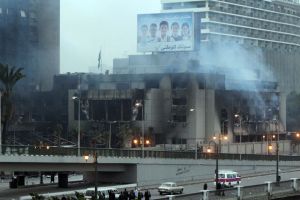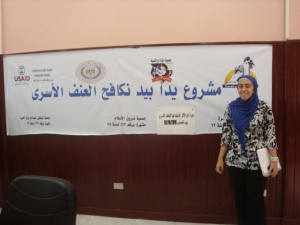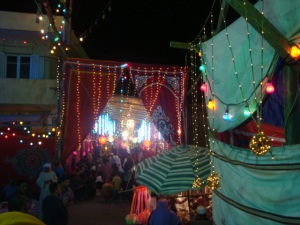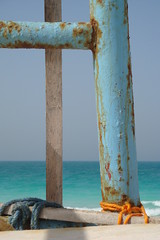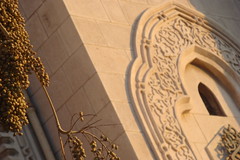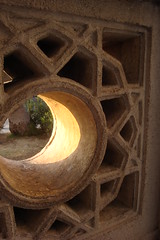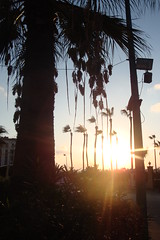تجارب المسلمين في أمريكا
ندى زهدي
2010-10-20
تاريخ المجموعة
على رغم أن كثير من الناس خلال العالم بدأوا يفكروا على مسئلة الإسلام في أمريكا (و في الغرب يشكل علم) يعد أحداث يوم 11 سبتمبر في عام 2001, يوجد تاريخ الإسلام في أمريكا اطول بكثير من هذه الفترة الأخيرة. وصلوا أول مسلمين في أمريكا في قرن 16, عندما بدأت الظاهرة معروف بإسم “تجارة العبيد.” بعض المستكشفين الاوربيين و المستوطنون الأمريكيون خطفوا ناس من غرب افرقيا و بعض الافريقيين كانوا مسلمين. معظم أصحاب العبيد فرضوا التحويل من دين الأسلام إلى دين المسيحي لعبيدهم, لكن هذا التعرض إلى إسلام في تاريخ أمريكا في وقت مبكرة أثرت العودة إلى إسلام من الأمركيين الأفارقة في القرن العشرين.
و بالإضافة إلى هذه الفترة, بدأ أن يهاجرو بعض سكان المناطق الاثمانية إلى اماكن معّينة في الولايات المتحدة في آخر قرن 19 و بداية قرن 20. على رغم أن كثير من هذه المهاجرين من الأراضي العثماني كانوا مسيحيون, كثير منهم كانوا مسلميون أيضاً, فقد بدأ فترة الهجرة الحديثة في تاريخ إسلام في أمريكا.
ليس من الممكن التحدث عن هذا المسألة بدون ذكر الحركات الإسلامية الأسود, خصوصاً ارتفاع “أمة الإسلام” في القرن العشرين. قدم هذا الحركة فُرص جديدة لتمكين المجموعة الأميركيون الأفارقة و بالإضافة إلى ذلك, معظم قيادات هذا الحركة كان عندهم شخصيات كبيرة(أبرز منهم كان “ملكوم اكس”) . و هذة العوامل شجعوا كثير م من الإميركيين الأفارقة إلى مشاركة في أمة الأسلام.
ضروري أن نعرف أن يعتبر هذا الحركة و أيديولوجيتها مختلفة من التيار الرئيسي الإسلامي, لكن مكانه ما زال مهم لأن دخلت معظم أتباع أمة الإسلام إلى التيار الرئيسي الإسلامي بعد وفى قائدهم و مئسسهم (“إيلايجا محمد”) في عام 1975.
آخرفترة تاريخة حديثية متعلق بهذا الموضوع هي الفترة من عام 1965 إلى الوقت الحالي. بعد مدّة طويلة, انفتح باب الهجرة إلى أمريكا بسياسة عام 1965, معروف بعلان “قانون الهجرة و الجنسية.” خلال العقود التالية, غيّر شكل سكان البلد بسبب هذا القانون بشكل عام, و بشكل خاص هو سمح الهجرة لكثير من المسلمين. و أغلبية المسلمين في أمريكا الآن (حوالي 67 في المئة) يتكون من مهاجرين من اماكن كثيرة, كلهم انتقلوا إلى الولايات المتحدة على سبب هذا القانون الحيوية.
أفكار المجموعة و واقعهم في أمريكا
1)التنوع و التعددية داخل مجموعة المسلمين في أمريكا
تقديرات في هذا اليوم يقولوا أن هناك بين 2 و 7 مليون مسلمون في أمريكا و هم يتكونو حوالي واحد في المئة من عدد السكان. و اكتشف استطلاع من مركز “بيو” في عام 2007 أن ليس هناك مجموعة أغلبية اعرقية في هذا الديموغرقية.هذا الحقيقة تختلف يشل كبير من الصورة النمطية التي يظّهر كل المسلمين كعرب. في الحقيقة, فقط 25 في المئة من عدد المسلمين في العالم هم عرب و أغلبهم غيرعرب. و توجد نفس الحالة في أمريكا ايضاً. تبّين الإحصاءات أن حوالي ربعهم من أصل عرب, و ربع من أصل الهند و باكستان و ربع أو ثلثهم الأميركيون الأفارقة, و هناك مجموع يتكون من المتحولين من أصل قوقازي. و لذلك, هو واضح أن التنوع من نحية العرق موجود بغزارة داخل طائفة المسلمون الأمريكيون. و فوق هذا, هناك تنوع من نحية تجربتهم الأقصادية. مع أن أغلبهم جز من الطبقة الوسطة, الأختلافات الأقتصادية بينهم مرطبتة مع أختلافات عرقية.
بالأضافة إلى الأختلافات اقتصادية و عرقية, الفرق الأفضل و مفيد أكثر بنسبة هذا التحليل بشك عام هو الفرق بين تجربة المسلمون الأمريكيون المهاجرون (الذين هاجروا من بلاد في افريقيا و آسيا و الشرق الاوسط و اماكن آخرى) و المسلمون الذين يعتبرو من السكان الأصليين (مثل الأميركيون الأفارقة و المتحولون من أصل قوقازي). هذا الفرق يؤثر على تجربات و اتحديات المختلفين للإمسلمون في أمريكا إلى أقصى حد.
2) ما هو شكل الهوية الإسلامية الأمريكية؟
التنوع الثقافي داخل هذا المجموعة يؤثر على الهوية الإسلامية الأمريكية لأن فهم شخص عن دينه يقوم على السياق القومي الذي يعلم دينه في (إلى حد ما). و لأن هناك اشخاص من اماكن كثيرة خلال العالم في المساجد في أمريكا, احياناً هناك توترات بين الأعضاء. على سبيل المثال, هناك أختلافات رقيقة في طريقة الصلىة و الملابس الدينية بين المسلمين من دول مختلفة, و احياناً يصنع هذة الأختلافات صراعات عقائديه داخل المساجد في أمريكا. لكن في معظم الوقت, هم يوحّدون حول فكرة الهوية الأمريكا, شيء مشترك بين كل المسلمين الأمريكيين (المهاجرين و السكان الأصليين ايضاً). و لذلك الهوية الإسلامية المريكية يدور حول هوية الأمريكية المشتركة و ايضاً طبعاً حول التقاليد الإسلامي (حتى على الرغم أن يوجد أختلافات دينية رقيقة بين بعضهم).
قضايا الخلافية
معروف أن احداث 11 سبتمبر غيرت العلاقات بين مسلمين و غير مسلمين في كل زاوية العالم, خاصة في موقع هذه الاحداث, الولايات المنحدة. في الوقت الحاضر, يناقش كثير من الناس داخل و خارج أمريكا عن قضايا خلافية محيطة بمكان إسلام في أمريكا.
1) دور الإعلام في صنع صور نمطية:
بعص أو ربما معظم الامريكيون يجيبون معلوماتهم عن إسلام من الإعلام بدون تعليق من أي مسلم نوسه أو من أي مسلمة نفسها, و النتيجة من هذا الحال هي الصور النمطية التي يظاهر كل المسلمين بشكل واحد و بشكل سلبي. المسلمون الأمريكيون يهتمون كثير بهذا المشكلة, و بعضهم يظنون أن أساس المشكلة هو الحقيقة أن ألإعلام لا يسمح أو ينشر آراء من المسلمين أنفسهم في برامجهم. لكن بعض الأمريكين يجابون على هذا الشكوى برائهم أن المسلمون مسؤولون على هذا المشكلة لأنهم لا يتحدثو ضدّ التطرف في صفوفهم. و الإجابة من المسلمين لهذا الشكوى أنهم فعلاً يرفع صوتهم ضدّ التطرف لكن لا يظهر أفكارهم و أحداثهم السلمية الذين يشجع الى التسامح لأن الإعلام يقوم على مواضيع سلبي و خلافية فقط, و ليس في اهتمام في هذا القطاع باشياء إجابية عن المسلمين.
في وجهة نظري, المسألة فعلاً معقدة لأن دائماً يصنع الإعلام صور نمطية و تغير هذا الحالة صعب جداً أو ربما أمر مستحيل. و بسبب هذا, أظن أن من الأهم و أفضل طرق فعالية لإصلاح سوء التفاهم بين المسلمين و الأخرين هي تعرض المسلمون العاديون إلى الأمريكيين غير مسلمين–تعرض إلى حياتهم وأفكارهم اهتمامهم. هذه الطريقة سيضدّ الصور النمطية السلبية (التى تصنعهم الإعلام) و سيفتح باب حوار الذي يؤدي إلى التفاهم و التعاون سلمياً حقيقياً. المسلمون في أمريكا محتجين تمثيل الذاتي في الإعلام. و فوق هذا, اعتقد أن هناك دوراً بارزاً لالتفاهم بين المسلمين و غير مسلمين على سبيل العلاقات الشخصية .
2) كيف نحقق الأمن القومي و نضمن حقوق المسلمون الأميركيون في نفس الوقت؟
بعص المتعصبين الامركيين يشعرون بالخوف من المسلمين داخل بلادهم من نحية الأمن القومي لأنهم يؤمنون بالاشاعة التي تقول أن كل مسلم متطرف أو إرهابي. و احياناً بعض المسلمين الامريكيين يقالون أنهم يعاى من التمييزو يريدون المساواة في المجتمع الأمريكي. أساس المشكلة في وجهة نظري هو التوتر بين تحقيق الأمن القومي و ضمن حقوق المسلمون. واحد من أبرز أمثلة عن هذا الموضوع هو التنميط العنصري الذي يعانى يعض المسلمون (خصوصاً في المطارات خلال السفر). المجموعة التي تؤيد هذا السياسة يرأونها كشيء اجابي و منطقي لأن كل الإرهابيون الذين هاجمو أمريكا في الوقت الحديث هم يعتبرون مسلمون. و المجمعة التي تعارض هذا الفكرة تقول أن استحال التبرير عن هذه الفكرة و أن كل المواطنون عندهم المساواة في الحقوق و ايضاً أن لا تقتصر هذه الحقوق لبعض المريكيين فقط.
بشكل عام, في هذا المناقشة عن اندماج المسلمون في المجتمع الإمريكي, أرى أن يوجد تحديات كبيرة لالحصول على هذا الهدف لأن التوتر بين التحفيظ على الأمن القومي و التحقيق على المسلمون الأمريكيون. قد نعرف إجابة لهذا القضية أذا ركّزنا على التوازن بين الهدفين بشكل مستمر. هذه الطريقة الوحيدة التي من الممكن أن ننجح فيها لأن أهمية الأمن القومي واضح, لكن فوق هذا لا يدّ أن نحمل الحقوق لكل مواطن لأن حملة الحقوق هي قاعدة الأيديولوجية الأمريكية. في وجهة نظري, أذا سمحنا استثناء و لا نضمن حقوق المسلمين في أمريكا,فكل المواطنون سيكونون أسوأ حالا على المدّى البعيد.
المراجع
• “المسلمون الأميركيون : الطبقة الوسطى ومعظمهم من التيار الرئيسي.”
Pew Research Center. عام 2007.
• مقالة عن “إسلام في أمريكا.” موقع ويكيبيديا.
The Experiences of Muslims in America
History
Although many people throughout the world began thinking about the issue of Islam in America (and in the West in general) after the events of September 11, there exists a history of Islam in America much longer than this latest period of time. The first Muslims arrived to America in the 16th century, when the phenomenon known as the slave trade began. Some European explorers and American settlers kidnapped people from West Africa, and some of the Africans were Muslims. Most of the slave owners required their slaves to convert from the religion of Islam to Christianity, but this exposure to Islam in America at an early period of time influenced the return to Islam by African Americans in the 20th century.
In addition to that period of time, some residents in Ottoman territories began to migrate to particular places in the United States at the end of the 19th century and beginning of the 20th century. Although most many of these immigrants coming from Ottoman land were Christians, many were also Muslims. Thus began the period of modern migration in the history of Islam in America.
It is not possible to discuss this topic without mentioning the Black Muslim movements, in particular the growth of the Nation of Islam in the 20th century. This movement presented new opportunities for the empowerment of the African American community. In addition to that, most of the leaders of this movement had large personalities (the most prominent being Malcolm X). These factors encouraged many African Americans to participate in the Nation of Islam. We must recognize that this movement and its ideology are considered different from mainstream Islam, but its role is still important because most of the followers of the Nation of Islam entered mainstream Islam after their leader and founder Elijah Muhammed died in the year 1975.
The last modern historical period associated with this topic is the period between 1965 to the present day. After a long period of time, the door of migration to America was opened with a policy in 1965, known under the title, “The Immigration and Nationality Act.” The appearance of the country changed in a general way due to this law, and in particular it allowed the migration of many Muslims. And the majority of Muslims in America today (about 67%) consists of immigrants from many different places, all of them having moved to the United States thanks to this vital law.
Thoughts of this Group and Their Reality in America
1. Diversity and Pluralism amongst Muslims in America
Statistics today state that there are between 2 and 7 million Muslims in America and that they comprise about 1% of the American population. A poll conducted by the Pew Research Center in 2007 discovered that there does not exist a majority ethnic group in this demographic. This fact differs greatly from the stereotype that makes all Muslims appear to be Arabs. In actuality, only 25% of the global Muslim population is Arab and most Muslims are not Arab. And there exists this same state in America also. Statistics show us that about a quarter of Muslims in America are Arab, a quarter are South Asian, and a quarter or a third are African American. And there is also a group that consists of converts of Caucasian background. And because of this, it is clear that ethnic diversity exists in abundance inside the group of Muslim Americans. Moreover, there is diversity in terms of their economic experiences as well. Although most of them are part of the middle class, economic differences between them are associated with ethnic differences. In addition to economic and ethnic differences, a preferable and more beneficial general distinction in terms of analyzing this community is the difference between the experiences of immigrant Muslim Americans (who migrated from countries in Africa, Asia, the Middle East and elsewhere), and the Muslims that are considered indigenous (like African Americans and converts of Caucasian background). This distinction influences their differing experiences to the greatest extent.
2. What does Muslim American identity look like?
The cultural diversity that exists inside the community of Muslim Americans influences American Muslim identity because an individual’s understand of their religion is based on the national context in which they learned their religion (to a certain extent). And because there are individuals from many different places throughout the world in the mosques of America, sometimes there are clashes between their members. By way of an example, there are subtle differences by the way of prayer and in religious dress between Muslims from different countries, and sometimes these differences produce ideological conflicts inside the mosques of America. But in most cases, they unite around the idea of America identity, something which is shared between all Muslim Americans (the immigrant Muslim Americans and indigenous Muslim Americans as well). And because of this, American Muslim identity revolved around their shared American identity and also of course around shared Islamic traditions (even though there are religious differences between some of them).
Controversial Issues
It is well-known that the events of September 11th changed relations between Muslims and non-Muslims in every corner of the world, especially in the location of those events, the United States. In the present day, many people inside and outside of America discuss the controversial issues surrounding the place of Islam in America.
1. The Role of Media in Producing Stereotypes:
Some or perhaps most Americans get their information about Islam from the media, without comment from any Muslim themselves. The result of this situation is the stereotypical images that present all Muslims in a single, negative light. Muslim Americans are very interested in this problem, and some of them feel that the basis of the problem is the fact that the media does not allow or does not publish opinions from Muslims themselves in their programs. But some Americans respond to this complaint with their opinion that Muslims are responsible for this problem because they do not speak out against the extremists in their ranks. And the answer from Muslims to this complaint is that they do indeed raise their voices against extremism but their peaceful ideas and events that encourage coexistence do not appear because the media is based on negative and controversial issues only, and that there is not interest in this sector on positive aspects of Muslims.
In my opinion, this issue indeed is complicated because the media always seems to produce stereotypical images and to change this situation seems very difficult if not impossible. And because of this, I think the most preferable and important effective way to improve the misunderstand between Muslims and non-Muslims is to expose non-Muslim Americans to everyday Muslims – exposure to their lives and thoughts and interests. This method will oppose the negative stereotypes (that the media produces) and will open the door of dialogue that leads to true understanding and peaceful cooperation. Muslim Americans are in need of self-representation in the media. Moreover, I think that there is a prominent role to be played by interpersonal relations in order to promote more mutual understanding between Muslims and non-Muslims.
2. How can we ensure national security and guarantee the rights of Muslim Americans at the same time?
Some intolerant Americans are afraid of the Muslims living inside their country in terms of national security because they believe in the rumor that states that all Muslims are extremists or terrorists. And sometimes some Muslim Americans state that they suffer from discrimination and that they desire equality in American society. The basis of the problem in my opinion is the tension between ensuring national security and guaranteeing the rights of Muslim Americans. One of the most prominent examples in this topic is the racial profiling that some Muslims suffer from (especially in airports while traveling). The group that is in support of this policy view it as something positive and logical because all of the terrorists that have attack America in recent times have been considered Muslims. And the group who opposes this idea states that there is no justification for this idea and that all Americans deserve equal rights and that full rights are not only limited to some Americans.
In general, in this discussion on the integration of Muslims in American society, I see that there exist many challenges in an effort to attain this goal because of the tension between ensuring national security and guaranteeing the rights of Muslim Americans. We may find an answer to this issue if we focus on the balance between the two objectives in a continuous way. This is the only way that it might be possible for us to succeed because of the importance of national security is clear, but above that we must protect the rights of all Americans because the protection of rights is the basis of the American ideology. And in my point of view, if we allow an exception to be made and we do not guarantee all the rights of Muslims in America, then all Americans will be worse off in the long run.
thoughts?

